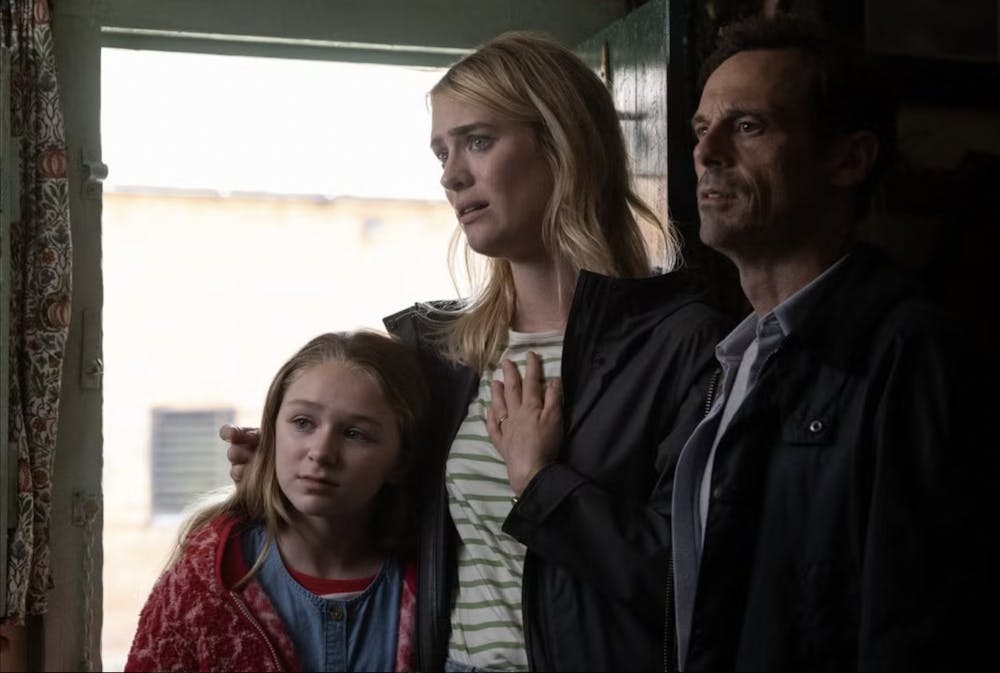“Speak No Evil,” the newest release from director James Watkins, is a classic horror film — filled with the tropes and thrills most beloved by fans of the genre. But underneath its formulaic plot is an interesting exploration of gender performance.
The film follows Americans Louise (Mackenzie Davis) and Ben Dalton (Scoot McNairy), and their daughter Agnes (Alix West Lefler) as they spend a weekend with British couple Paddy (James McAvoy) and Ciara (Aisling Franciosi), and their son Ant (Dan Hough) at their country house. But what should be an idyllic vacation, turns eerie. Between Ant’s inability to speak and his panicked fits, Paddy and Ciara’s often strange and unsettling behavior, Louise quickly realizes something strange is afoot. Ben, on the other hand, pushes her concerns aside.
In a roundtable interview with The Herald, Davis spoke about her experiences starring in “Speak No Evil.”
Davis explained how she related to and embodied her character in the film. “Especially for women, there’s this desire to be easy and cool. You bear the weight of a society that sometimes isolates you, but you don’t want to complain about it all the time because it makes you a killjoy,” she said. “So, you might complain three or five times, but then try to be easy and fun. I used that to understand Louise.”
“You can see it in her relationship with her family — her husband is having an easy time, the kids are enjoying themselves, and she’s asking: ‘Why can't I enjoy this too?’ She’s right to feel uneasy, but there’s a desire to fit in,” Davis added.
In fact, much of the suspense in “Speak No Evil” relies on the conflict between Louise and Ben. The film makes several callbacks to past issues in their marriage and showcases Ben’s repeated refusal to listen to Louise’s concerns.
Davis felt a similar sense of frustration when playing Louise.
“I struggled at first with why she was so silent because she had good instincts and knew what was happening most of the time. It was a challenge to justify that silence. I’m impulsive and would have acted on my instincts. I made up a backstory to help it make sense for me. I wanted her to be layered and complicated, not just subservient,” she said.
Louise and Ben’s relationship dynamic is especially interesting when compared to Paddy and Ciara’s picture-perfect infatuation with each other — although cracks in their relationship appear in their disparaging treatment of Ant. In a heated moment where Louise and Ben know they are in danger and try to calmly leave, Paddy and Ciara bar their way. Louise utilizes Paddy and Ciara’s seemingly secure relationship as bait, going off on a speech about how her own unfaithfulness led to her marriage with Ben going awry.
Davis explained that, at first, she thought this scene came “out of nowhere.”
“It took me a long time to figure out the goal of that scene. Even down to the second of shooting, I was still wondering what it was about,” she said. “It took a lot of work, and James Watkins was great at humoring me through it.”
Though these suspenseful moments often toe the line a little too closely between anxiety-inducing annoyance and apathetic tedium, Davis’s character brings much-needed expressive and emotional depth to the film.
“In the movie, my character is more compliant because there’s been a transgression in the marriage. I see it as a gesture of solidarity, like, ‘You’ll take the lead on this trip, and if we survive, I’ll get the next one,’” Davis said. “The film does a funny exploration of gender performance, especially with the men, but it’s not heavy-handed or didactic. It’s a fun exploration of how gender impacts social behavior.”
Davis also discussed some of her inspirations for the film. She referenced the bourgeois couples in Austrian director Michael Haneke’s films such as “Caché” and “Funny Games” with characters who were “a bit divorced from their instincts.”
Interestingly, Davis decided not to watch, nor was she encouraged to watch, the 2022 Danish film of the same name that “Speak No Evil” was based on. She wanted the 2024 version to be her own and let things “unfold organically.”
During the interview, Davis also shared her experience with social anxiety, which she sees reflected in the film.
“Being alive is hard,” Davis said. “You’re trying to be empathetic, understanding, caring, intuitive and respectful to yourself — it’s a lot to juggle.”
“The film places social anxiety on the same plane as mortal danger because that’s how it feels,” she added. “You have a fight-or-flight response to social missteps, and the movie captures that feeling.”
Perhaps it is those frequent personal moments of terror people feel in their own lives — social awkwardness or uneasy tension — mirrored on screen that draw audiences to the horror genre.
“At a screening last night, people were clapping, screaming and groaning together, like the whole theater became one organism. You don’t get that anywhere else,” Davis said. “For actors, you just want to try your hand at everything. If I could find another (film) like this, I’d do it again.”





